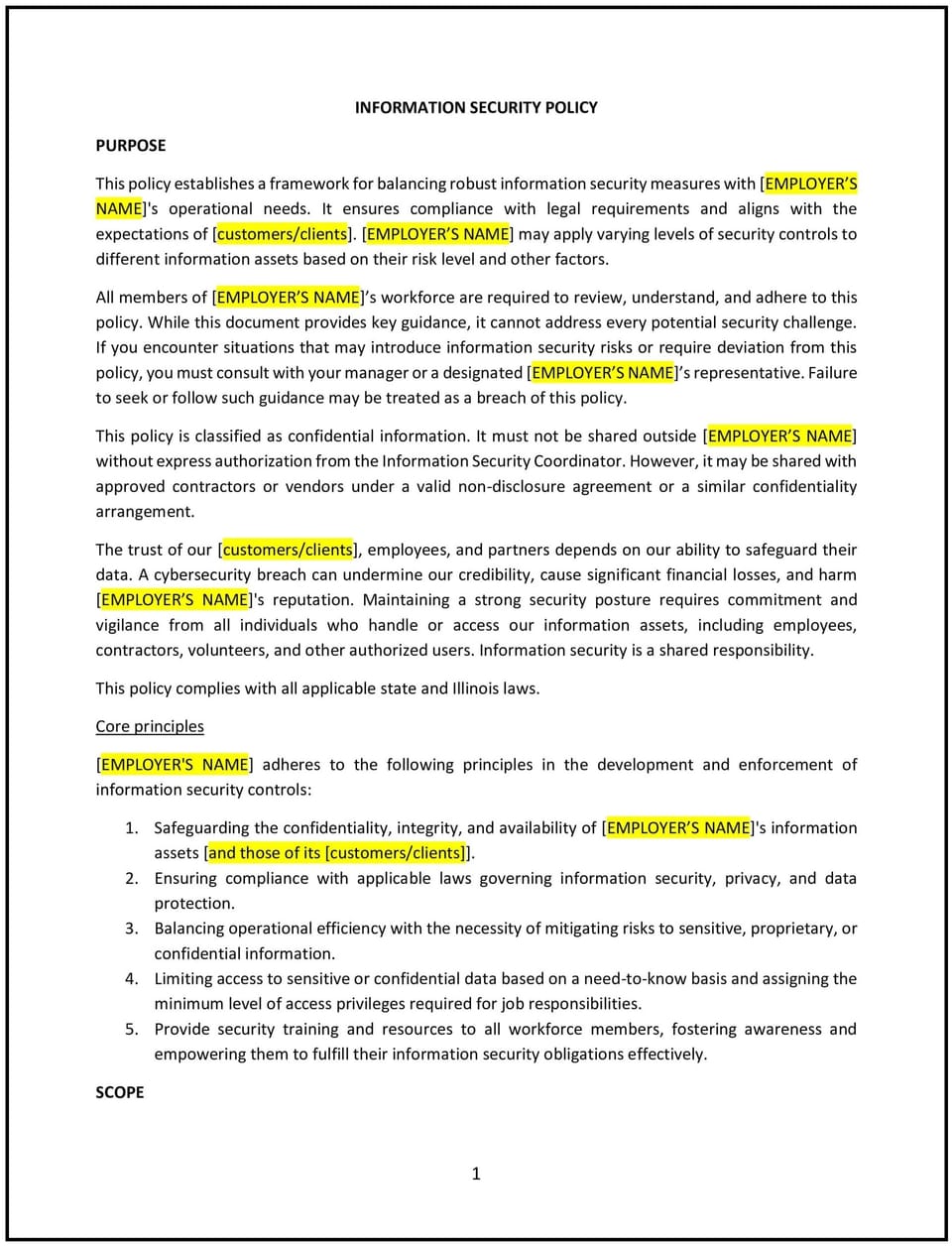Information security policy (Illinois): Free template

Information security policy (Illinois)
This information security policy is designed to help Illinois businesses protect sensitive data, systems, and networks from unauthorized access, breaches, and other cybersecurity threats. It establishes guidelines for data handling, access controls, and incident response while promoting compliance with Illinois privacy laws and regulations such as the Personal Information Protection Act (PIPA).
By adopting this policy, businesses can safeguard information, mitigate risks, and maintain trust with customers and stakeholders.
How to use this information security policy (Illinois)
- Define scope: Specify the types of data and systems covered under the policy, such as customer information, financial records, and proprietary business data.
- Establish access controls: Implement role-based access to ensure that employees can only access information necessary for their job responsibilities.
- Provide data handling guidelines: Include procedures for storing, transmitting, and disposing of sensitive data securely.
- Require strong authentication: Mandate the use of strong passwords, multi-factor authentication, and secure login protocols.
- Include incident response procedures: Detail the steps for reporting, investigating, and resolving security breaches or incidents.
- Conduct regular audits: Schedule periodic security assessments to identify vulnerabilities and ensure compliance with the policy.
- Provide employee training: Offer ongoing training on cybersecurity best practices, including recognizing phishing attempts and handling sensitive data.
- Monitor compliance: Regularly review and update the policy to align with changes in Illinois laws, technology, and emerging threats.
Benefits of using this information security policy (Illinois)
This policy provides several benefits for Illinois businesses:
- Protects sensitive data: Reduces the risk of data breaches and unauthorized access.
- Enhances compliance: Aligns with Illinois laws, such as PIPA, to avoid penalties and regulatory issues.
- Builds customer trust: Demonstrates a commitment to safeguarding customer information and privacy.
- Reduces downtime: Minimizes disruptions caused by security incidents or breaches.
- Supports accountability: Establishes clear roles and responsibilities for maintaining information security.
Tips for using this information security policy (Illinois)
- Communicate the policy: Share the policy with employees during onboarding and ensure it is easily accessible in the workplace.
- Update technology: Use firewalls, encryption, and other tools to secure data and systems effectively.
- Test incident response plans: Conduct regular drills to ensure employees understand their roles during a security incident.
- Encourage reporting: Create a culture where employees feel comfortable reporting security concerns or incidents promptly.
- Update regularly: Revise the policy to reflect changes in Illinois laws, workplace practices, or cybersecurity threats.
Q: What types of data are protected under this policy?
A: This policy covers sensitive data such as customer information, financial records, proprietary business data, and any information protected by Illinois law.
Q: Who is responsible for information security?
A: Information security is a shared responsibility, with designated IT personnel, managers, and employees playing specific roles.
Q: What are the consequences of a security breach?
A: Consequences may include operational disruptions, legal penalties, reputational damage, and costs associated with breach resolution.
Q: How are security incidents reported?
A: Employees should report incidents immediately to their manager or IT department using the procedures outlined in this policy.
Q: What training is provided under this policy?
A: Employees receive regular training on cybersecurity best practices, such as recognizing phishing attempts, secure data handling, and using strong passwords.
Q: How often is this policy reviewed?
A: This policy is reviewed annually or whenever significant changes occur in Illinois laws, technology, or cybersecurity threats.
Q: What tools are used to secure data?
A: Tools such as firewalls, encryption, and multi-factor authentication are implemented to protect data and systems.
Q: Does this policy apply to third-party vendors?
A: Yes, third-party vendors working with the company are required to adhere to the company’s information security standards.
This article contains general legal information and does not contain legal advice. Cobrief is not a law firm or a substitute for an attorney or law firm. The law is complex and changes often. For legal advice, please ask a lawyer.


